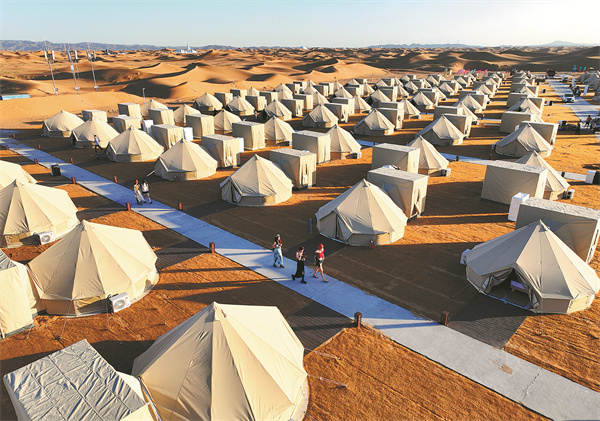
Camping tents in July in the Tengger Desert in Zhongwei, Ningxia Hui autonomous region, a popular destination for nature lovers, provide overnight shelter and the opportunity to witness sunrises and enjoy stargazing.[Photo provided by Yu Jing/China News Service]
When it comes to group travel, tourists are often guided through rigid itineraries, shuttling from attraction to attraction and battling endless shopping promotions. But the rise of personalized travel experiences in China is challenging this norm.
"Our principle is simple — we never rush our guests," says Yang Wei, a private travel planner based in Northwest China's Ningxia Hui autonomous region.
A former media professional, Yang ventured into personalized travel planning in 2013. Initially, she found it challenging to promote the new travel service to tourists, but posting well-crafted content on short video platforms helped her attract a large following and her business gradually took shape.
"We provide thorough services for our guests throughout their trips," Yang says. Her team covers almost every aspect of the travel experience, offering everything from customized itineraries and guided tours to travel photography, hotel booking and ticket booking services. "We also advise on what to wear and what to bring for a trip," she adds.
They are also appealing to high-end tourists by designing unique travel routes, including desert adventures and stargazing tours in Ningxia, presenting the best of the region to their customers.
"The number of tourists usually jumps in June and peaks in July and August. However, this year saw a surge of tourists early in April," Yang says.
According to the Ministry of Culture and Tourism, China recorded about 295 million domestic tourist trips during the five-day May Day holiday this year, up 7.6 percent year on year. Data from Chinese payment services platform Alipay indicate that during the holiday, cross-city payments saw significant growth in cities such as Zhongwei and Wuzhong in Ningxia.
"Following the development of tourism, travelers are increasingly prioritizing cultural experiences," says Xi Meinong, who owns a homestay business in Ningxia. To cater to the needs of tourists, the homestay regularly organizes art exhibitions and cultural events, inviting artists to undertake residencies to enrich the cultural environment for guests.
Study tour guide Xue Kun is in another emerging profession providing customized travel services. She combines education with travel, enhancing students' understanding and appreciation of local history and culture through in-depth explanations.
"We design study tours according to the knowledge bases and cognitive abilities of students in different age groups, incorporating sites like the Western Xia Imperial Tombs, the Helan Mountain rock paintings and the Shuidonggou archaeological site," Xue says.
Zhang Xiaomin, who traveled from the southern Chinese city of Guangzhou, Guangdong province, was surprised by the changes in her hometown of Ningxia when she returned on a personalized tour last summer.
"It was such an incredible experience to sit on the sand at night and enjoy shows, music and the starry sky. The visit showed me that Ningxia's level of services has improved markedly," Zhang says.
Zhou Shanyu had a similar experience when she traveled from East China's Zhejiang province. During a study tour in Ningxia, she and her child took part in a straw-net-paving experience in the desert, a practice that reduces wind speeds and corrects moving sand dunes.
"Besides knowledge from books, children also need to experience things handson, through their own eyes," Zhou says.
Emerging professions such as travel planner, homestay manager and study tour guide are revitalizing the tourism sector and creating job opportunities for many young people.
Looking ahead, Yang plans to expand her business to international tourists.
"Travel is not just about sightseeing. It's a journey to be immersed in the local culture," she says, adding that she believes the tourism market in China is likely to see greater segmentation and diversity in the future.
Editor Ⅰ: Zhang Wenwen
Editor Ⅱ: Wu Dan
Editor Ⅲ: Liu Guosong














